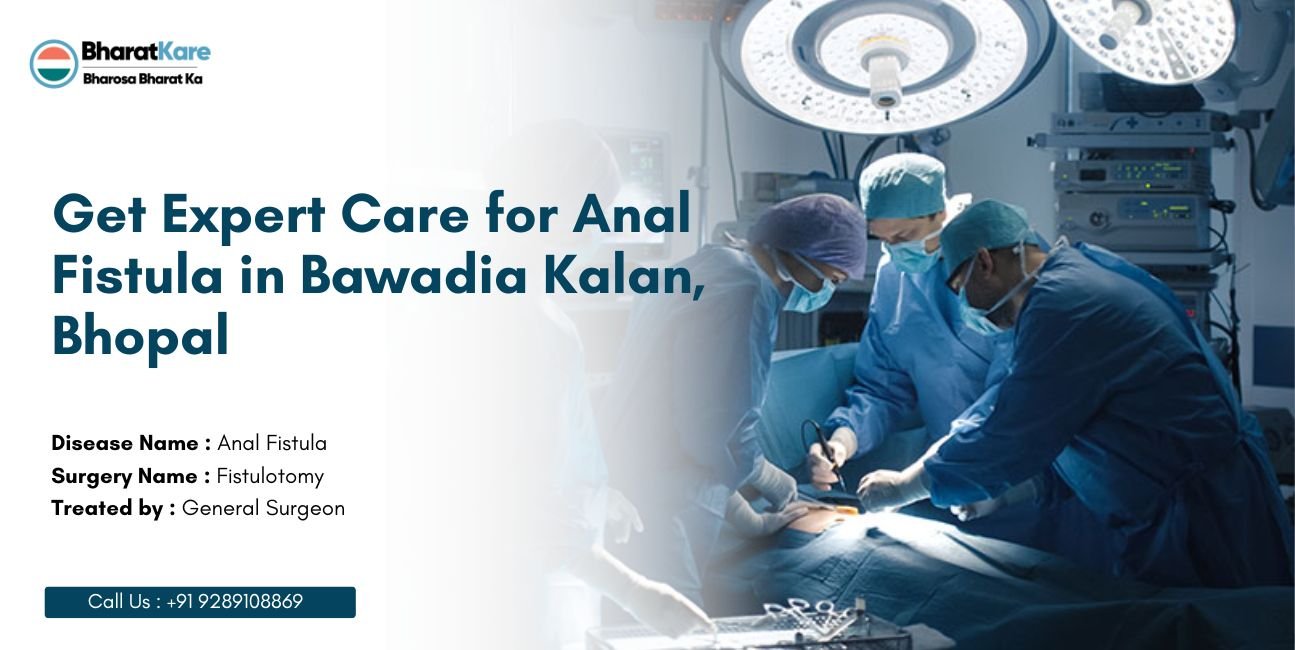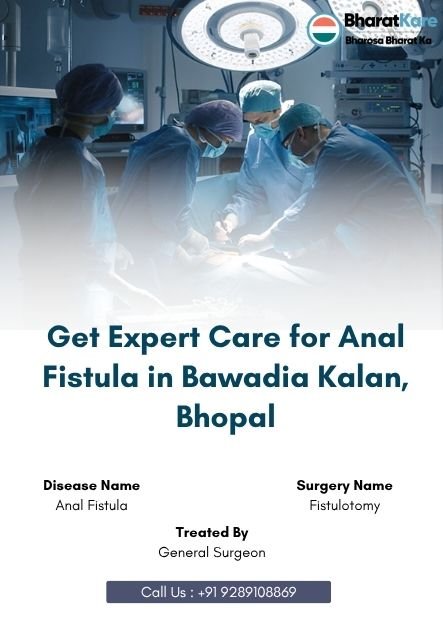Get Expert Care for Anal Fistula in Bawadia Kalan, Bhopal
Look, I get it. Nobody wants to talk about anal problems. It’s embarrassing. It’s uncomfortable. And honestly? It’s downright painful—both physically and emotionally.
But here’s what I’ve learned after two decades in medical writing: staying silent about your symptoms only makes things worse. That nagging discomfort, the drainage that forces you to change underwear multiple times a day, the constant worry about odor—it’s stealing your life one day at a time.
Here’s some relief: if you’re dealing with Anal Fistula in Bawadia Kalan, you don’t need to pack bags for Mumbai or Delhi anymore. Quality treatment is available right here, and I’m going to walk you through everything you need to know.


What Exactly Is This Thing?
An anal fistula is basically a tunnel that shouldn’t exist. Think of it as your body creating a shortcut between the inside of your anal canal and the skin outside. Sounds weird, right? That’s because it is.
Most fistulas start with an infected gland inside your anus. This infection creates an abscess—a pocket of pus that needs somewhere to go. Sometimes it drains on its own, sometimes a doctor drains it. Either way, that drainage path can turn into a permanent tunnel. And boom—you’ve got yourself a fistula-in-ano.
What causes the initial infection? Could be anything:
- Sometimes it’s just bad luck with bacteria
- Crohn’s disease is a major culprit
- Old surgical scars can be problematic
- Chronic bathroom issues (we’re talking severe constipation or diarrhea)
- Rarely, things like TB or other infections
The kicker? About half of people who get an anal abscess end up with a fistula later. Knowing this can save you months of wondering “what went wrong?”
How Do You Know You Have One?
Your body isn’t shy about telling you something’s off. Here’s what people typically experience:
- Pain that won’t quit: It throbs. It gets worse when you sit or use the bathroom. Some days it’s bearable, other days you’re wondering how you’ll get through work.
- The drainage situation: This is usually the dead giveaway. You’ll notice discharge—could be clear, could be pus, might have blood. Sometimes it smells bad (let’s just be honest about it). You’ll find yourself buying more underwear than you ever thought necessary.
- Swelling you can feel: Run your finger near your anus (in private, obviously), and you might feel a tender lump. The skin looks red and angry.
- Your whole body feels off: Low-grade fever that comes and goes. Tiredness that isn’t explained by lack of sleep.
- Bathroom troubles: Some people find it harder to control their bowels. Others just dread going because it hurts.
Sound familiar? Then it’s time to stop googling and start calling. Getting Expert Care for Anal Fistula in Bawadia Kalan means talking to someone who’s seen this exact situation hundreds of times.
Don’t ignore the discomfort—consult a Care for Anal Fistula in Bawadia Kalan. Book your appointment today!
Why Stay Local for Treatment?
I’ve heard every excuse in the book: “The best doctors are in bigger cities.” “Nobody here can handle my case.” “I should go to [insert famous hospital name].”
But here’s reality: medical expertise isn’t hoarded in metropolitan areas anymore. When you need treatment for Anal Fistula in Bawadia Kalan, staying close to home actually works in your favor.
Think about it practically:
- Your mom can bring you home-cooked food while you recover (hospital food is terrible everywhere)
- Follow-up appointments don’t require taking a whole day off
- If something feels wrong during healing, your doctor is 20 minutes away, not in another city
- You’re not burning money on hotels and travel
- Your support system is right there
Plus, let’s be real—traveling after anal surgery sounds like torture. Why put yourself through that?
What Are Your Treatment Options?
Alright, let’s get into the good stuff. How do doctors actually fix this?
The Laser Approach (My Personal Favorite to Recommend)
Laser treatment for perianal fistula is honestly pretty amazing. The surgeon uses a laser fiber to seal the fistula tract from the inside. The laser energy basically cauterizes everything shut while preserving the muscle that keeps you continent.
Why do patients love it?
- You’re back home the same day
- Pain is minimal (we’re talking manageable with regular painkillers)
- Most people return to desk jobs within 3-5 days
- Your sphincter muscles stay intact (translation: no worrying about accidents)
- Lower chance of this thing coming back
I’ve talked to guys who went back to playing cricket within two weeks. One teacher I know was in her classroom after a week. That’s the kind of recovery we’re talking about with laser fistula surgery.
VAAFT – When They Need to See What’s Going On
Video-Assisted Anal Fistula Treatment is like giving your surgeon a camera to work with. They can see exactly where the tract goes, any branches it has, and seal everything precisely. Works great for complex cases where the fistula decides to get creative with its path.
Old-School Surgery
Sometimes the traditional fistulotomy is still the best choice. The surgeon opens up the tract and lets it heal from the bottom up. Recovery takes longer—we’re talking weeks, not days—but for certain types of fistulas, it’s still the gold standard.
There’s also fistulectomy where they remove the entire tract. Your surgeon will recommend what makes sense for your specific situation.
Finding the Right Doctor Matters More Than You Think
Not every surgeon is created equal. When you’re looking for treatment for Anal Fistula in Bawadia Kalan, here’s what separates the good from the great:
- Experience counts: You want someone who’s done this specific procedure dozens of times, not someone who does it occasionally between other surgeries. Ask directly: “How many fistula repairs have you performed?”
- They should explain things clearly: Medical jargon is easy. Explaining things so you actually understand? That takes skill and patience. If your doctor makes you feel stupid for asking questions, walk out.
- They offer multiple solutions: Beware of the surgeon who only knows one technique. Different fistulas need different approaches. Intersphincteric fistulas are straightforward. Transsphincteric ones need more careful planning. Your doctor should have several tools in their toolkit.
- Imaging isn’t optional: Any good colorectal surgeon will want an MRI fistulography or endoanal ultrasound before operating. They need to see the roadmap before starting surgery. If someone wants to operate based on physical examination alone, get a second opinion.
- They care about your outcome: This seems obvious, but you’d be surprised. The right surgeon worries about your sphincter function, your quality of life, and whether you’ll be able to play with your kids without worry.
Walking Through the Treatment Journey
Let me paint a realistic picture of what happens.
Your First Visit
You’ll meet with the proctologist, probably feeling nervous. They’ll ask questions that feel invasive but are necessary. Then comes the examination—yes, they need to actually look and feel. Most doctors are surprisingly gentle and quick about it.
You might get an anoscopy (a small scope to look inside). They’ll probably order imaging. The whole visit takes maybe 45 minutes.
Planning Your Treatment
Once the imaging comes back, you’ll discuss options. This is your chance to ask everything:
- What’s success rate for someone like me?
- How long before I’m back to normal?
- What about pain?
- Can I still… (insert whatever activity you’re worried about)?
- What if it comes back?
Write your questions down beforehand. When you’re nervous, it’s easy to forget.
Surgery Day
Most fistula procedures are day-care surgeries. You come in morning, get the procedure, rest a few hours, and go home. The actual surgery takes 30-60 minutes. You’ll either get general anesthesia (you’re completely out) or spinal anesthesia (numb from waist down).
You won’t feel anything during the procedure. That’s a promise.
What Recovery Actually Looks Like
Let me be straight with you—the first 48 hours aren’t fun. You’ll have some pain. Sitting feels weird. The first bowel movement is scary (though usually not as bad as you imagine).
Laser treatment recovery:
- Days 1-2: Take it easy, use ice packs, take your pain meds
- Days 3-5: Pain drops significantly, you’re moving around normally
- Week 2-3: Feeling pretty normal, maybe some residual soreness
- Week 4+: Basically back to life as usual
Traditional surgery recovery:
- Week 1: Real discomfort, lots of sitz baths, staying home
- Weeks 2-3: Improvement but still needing time off
- Weeks 4-8: Gradual healing, wound care continues
Don’t ignore the discomfort—consult a Care for Anal Fistula in Bawadia Kalan. Book your appointment today!
Real Talk About Recovery at Home
Your doctor will give you a list of instructions. Actually follow them. Here’s the practical version:
- Keep it clean: After every bathroom trip, clean gently with water. Pat dry (don’t rub). Sitz baths are your friend—sitting in warm water 3-4 times daily feels amazing and helps healing.
- Eat right: High-fiber diet is non-negotiable. You want soft, easy bowel movements. Drink water like it’s your job. Stay away from spicy food, alcohol, and anything that gives you bathroom troubles.
- Don’t be a hero with pain: Take the prescribed painkillers. Pain slows healing. Also, unnecessary suffering doesn’t earn you any medals.
- Move, but don’t overdo it: Walking is good. Hitting the gym is not. Heavy lifting can wait a few weeks.
- Show up for follow-ups: Your doctor needs to see how you’re healing. These appointments catch problems early.
Let’s Talk Money
Healthcare costs are stressful, I know. Treatment for Anal Fistula in Bawadia Kalan is generally more affordable than metropolitan hospitals, but prices vary based on:
- What procedure you need
- Hospital charges
- Anesthesia costs
- How many follow-ups you need
Insurance usually covers medically necessary fistula treatment. Call your insurance company before surgery and confirm:
- Is the hospital in-network?
- Do you need pre-authorization?
- What’s your co-pay?
- Is there a deductible?
Many hospitals offer payment plans if you’re paying out of pocket. Don’t be shy about asking. They’d rather work with you than have you delay necessary treatment.
Choosing Expert Care for Anal Fistula in Bawadia Kalan usually saves money overall. No travel expenses, no hotel bills, no missing extra work days.
Keeping This Thing from Coming Back
Getting rid of the fistula is step one. Keeping it gone is step two.
- If you have Crohn’s or colitis: Managing the underlying condition is critical. Your gastroenterologist and surgeon need to work together.
- Fix your bathroom habits: Chronic straining is your enemy. So is chronic diarrhea. Find the middle ground—soft, easy stools that don’t require pushing.
- Hygiene matters long-term: Keep the area clean. Use mild soap. If you can swing it, a bidet attachment for your toilet is life-changing.
- Pay attention to your body: New drainage? New pain? Don’t wait three months hoping it goes away. Call your doctor immediately.
Real Stories from Real People
Rajesh waited six months before getting treatment for Anal Fistula in Bawadia Kalan. His words: “I kept thinking it would get better. It didn’t. When I finally had the laser procedure, my biggest regret was not doing it sooner. I was back at my shop within a week, and it’s been two years without any problems.”
Priya, a school teacher, dealt with constant embarrassment. “The worst part was the smell and drainage. I was changing pads multiple times a day. After surgery, I cried from relief. I got my confidence back.”
These aren’t unusual stories. Most people kick themselves for waiting so long.
Finding Your Healthcare Team
Quality care is part good medicine, part good people. For Anal Fistula in Bawadia Kalan, look for:
- Modern facilities: They should have laser equipment, good operation theaters, and imaging capabilities on-site or readily accessible.
- A team approach: The surgeon is important, but so are the nurses, the anesthesiologist, the support staff. Everyone contributes to your experience.
- They treat you like a person: You’re not a procedure number. Your concerns matter. Your questions deserve real answers.
- Clear communication: No surprises about costs. No medical jargon when plain language works better. No rushing you through consultations.
This is where platforms like Bharatkare.com come in handy. They connect patients with verified specialists who meet quality standards. Instead of calling random clinics and hoping for the best, you can find experienced proctologists who have good track records. It’s like having a knowledgeable friend who knows all the good doctors.
Why People Wait (And Why You Shouldn’t)
The stigma around anorectal problems is real. People suffer in silence because they’re embarrassed. But here’s the thing—doctors who treat anal fistulas do this every single day. You’re not going to shock them. You’re not going to gross them out.
Waiting has real consequences:
- Your quality of life keeps declining
- Simple fistulas can become complex ones
- Infection risk stays high
- Treatment gets harder and more expensive
- You waste months or years being miserable
An anal fistula won’t heal by itself. That’s not pessimism; it’s medical fact. The tract needs to be surgically addressed.
Common Questions People Actually Ask
- Will it heal on its own if I just keep it clean? No. The tract is a structural problem, not just an infection. Surgery is necessary.
- I’m terrified of losing bowel control. Is that really a risk? With modern techniques, especially laser and sphincter-sparing procedures, the risk is very low. Experienced surgeons protect those muscles. Ask your surgeon about their incontinence rates.
- How soon can I go back to work? Depends on your job and procedure. Office work? Maybe a week. Construction work? Probably three weeks. Be honest with your surgeon about your job demands.
- Will people be able to tell I had surgery? No. The incisions are tiny, and they’re in a location nobody sees.
- What if it comes back? Recurrence rates with laser treatment are around 10-15%. If it happens, it can be treated again. The key is addressing any underlying issues.
The Technical Side Made Simple
Doctors classify fistulas using something called the Parks classification. Basically:
- Intersphincteric: Goes through the inner muscle ring. Easiest to treat.
- Transsphincteric: Crosses both muscle rings. Needs careful surgery to preserve function.
- Suprasphincteric: Goes up and around the muscles. More complex.
- Extrasphincteric: Takes a path outside the normal anatomy. Rarest and trickiest.
Knowing your type helps understand why your doctor recommends a specific approach.
When You Need More Answers
If you got a diagnosis for Anal Fistula in Bawadia Kalan but something doesn’t feel right, getting a second opinion is smart, not insulting. Seek another consultation if:
- The surgeon can’t clearly explain your fistula type
- They dismiss your concerns about continence
- You’ve had this treated before and it came back
- The recommended treatment seems overly aggressive (or too conservative)
- Your gut tells you something’s off
Good surgeons understand that major decisions deserve confidence.
Time to Make a Move
Still reading? Then you’re serious about fixing this. That’s good because every day you wait is another day of unnecessary discomfort.
Modern treatment for Anal Fistula in Bawadia Kalan works. Success rates are high. Recovery is manageable. Life after treatment is dramatically better than life with an active fistula.
You have access to experienced colorectal surgeons, laser technology, and proven procedures—all without leaving your city. The sphincter-preserving techniques available today mean you don’t have to choose between relief and continence.
Take the First Step Today
Expert Care for Anal Fistula in Bawadia Kalan isn’t just a phrase—it’s a reality. Qualified specialists are ready to help you get past this.
Here’s what you need to do:
- Stop putting it off
- Schedule a consultation (yes, today)
- Get a proper diagnosis with imaging
- Discuss your treatment options honestly
- Choose a date and get it done
Visit bharatkare.com to find verified proctologists in Bawadia Kalan who specialize in fistula treatment. You can check their credentials, read about their experience, and book appointments online. No more calling random clinics or relying on vague recommendations.
Your life is waiting on the other side of this treatment for Anal Fistula in Bawadia Kalan. No more discharge. No more pain. No more embarrassment. No more planning your day around bathroom access and changing clothes.
That sounds pretty good, doesn’t it? Make the call. Your future self is going to be really grateful you did.
FAQ
FAQs About Care for Anal Fistula in Bawadia Kalan: Answering Your Most Common Queries
The "best" treatment depends on your fistula's type and complexity. Laser treatment is highly recommended for many cases because it is minimally invasive, seals the fistula from the inside, and carefully preserves the sphincter muscles to prevent incontinence. While no surgery is completely painless, laser procedures involve significantly less pain than traditional surgery. The discomfort is typically manageable with simple painkillers, and most patients report a much easier recovery.
Recovery is notably fast with laser treatment. Most patients can go home the same day. You can expect to return to a desk job or normal daily activities within 3-5 days. Strenuous activities and heavy lifting should be avoided for about 2-3 weeks. Compared to traditional surgery, which can take weeks to heal, laser treatment gets you back to your life much quicker.
The primary advantage is sphincter preservation. Traditional surgery can sometimes involve cutting the muscles that control bowel movements, which carries a risk of incontinence. Laser treatment seals the fistula tract without cutting these crucial muscles, offering a much lower risk of affecting your bowel control and providing a higher success rate for complex cases.
Recurrence is possible with any fistula treatment, but the risk is lower with modern techniques. For laser procedures, the recurrence rate is typically around 10-15%. The key to preventing recurrence is proper initial treatment by an experienced surgeon who uses imaging (like MRI) to map the entire fistula tract and addresses any underlying conditions, such as Crohn's disease.
Look for a surgeon who specializes in proctology or colorectal surgery. Key things to check include:
Experience: Ask how many fistula repairs they perform regularly.
Techniques: Ensure they offer multiple options (like laser, VAAFT) and can explain which is best for your case.
Diagnostic Approach: A good surgeon will always recommend an MRI or ultrasound before surgery to plan the procedure accurately.
You can find verified and experienced specialists through platforms like BharatKare, which connects patients with qualified doctors in the Bawadia Kalan area.
Quick Links
Popular Surgeries
Find Us
© Copyright BharatKare 2025. All Right Reserved.


